#canadian prime minister justin trudeau
Text
0 notes
Text
Justin Trudeau: শেষ হয়ে গেল আঠারো বছরের উষ্ণ মধুর দাম্পত্য! কানাডার প্রধানমন্ত্রী এখন বিবাহবিচ্ছিন্ন...
জি ২৪ ঘণ্টা ডিজিটাল ব্যুরো: অবশেষে বিচ্ছেদের কথা ঘোষণা করলেন কানাডার প্রধানমন্ত্রী জাস্টিন ট্রুডো ও তাঁর স্ত্রী সোফি। বিচ্ছেদসংক্রান্ত আইনি নথিতে স্বাক্ষরও করেছেন তাঁরা। গতকাল, বুধবার ট্রুডোর কার্যালয় থেকে এই তথ্য জানানো হয়েছে। তাঁদের এই বিচ্ছেদের মধ্যে দিয়ে ট্রুডো-সোফির মধুর দাম্পত্যজীবনের আঠারোটি বছর অতিবাহিত হল! ২০০৫ সালের মে মাসের শেষের দিকে বিয়ে করেন জাস্টিন ট্রুডো ও সোফি। তিন সন্তান…
View On WordPress
0 notes
Text
GERMANY, CANADA PARTNER ON TRANSATLANTIC HYDROGEN TRADE
The leaders of Canada and Germany signed a green hydrogen deal on Tuesday, laying a path for a transatlantic supply chain as Europe seeks to lessen its dependence on Russian energy.“It’s a vote of confidence for Canada as a leader in clean energy,” Canadian Prime Minister Justin Trudeau said during a joint press conference with visiting German Chancellor Olaf Scholz.Russia has slashed its energy…

View On WordPress
#Canada#Canadian Prime Minister Justin Trudeau#German Chancellor Olaf Scholz#Germany#Russian Gas#Russian-Ukraine conflict#transatlantic hydrogen agreement
0 notes
Text
Canadaian PM Trudeau tests positive for COVID19
New Post has been published on https://www.timesofocean.com/canadaian-pm-trudeau-tests-positive-for-covid19/
Canadaian PM Trudeau tests positive for COVID19
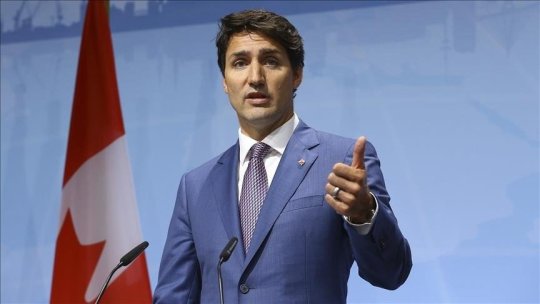
Washington (The Times Groupe)- Canadian Prime Minister Justin Trudeau said he tested positive for COVID19, but felt fine since he was vaccinated.
Trudeau wrote on Twitter, “I tested positive for COVID19. I’ll be following public health guidelines and isolating.” He added, “I feel fine, but I got my shots.”
“So, if you haven’t, get vaccinated – and if you can, get boosted. Let’s protect our healthcare system, each other, and ourselves,” he added.
He tested positive for COVID19 for the last time in January.
#Canadian prime minister Justin Trudeau#Coronavirus disease (COVID-19)#Coronavirus News and Latest Updates#Coronavirus pandemic news#COVID Live#COVID-19 Information#COVID19#health news#Latest COVID-19 Information#Medical and health information#public health guidelines and isolating#The Times Groupe#Times Of Ocean#Top Health News#Twitter#Unravel News#Health
0 notes
Text

#Christine Sinclair#Sincy#Justin Trudeau#Prime Minister Justin Trudeau#Prime Minister Trudeau#Sinc#12#CANWNT#Canadian Footballer#Canadian Football Player#Canadian Soccer Player#Canadian Athlete#Canadian Olympic Champion#Canadian Olympian#Canadian Legend#G.O.A.T.#Champion#Wonderful Woman#Wonderful Human Being#Favorite Burnabian#Favorite British Columbian#(by the way; there are two Sinclairs from BC on this picture technically!)#Favorite Canadian#Canadian Instagram#Canada Chronicles
3 notes
·
View notes
Text

#Canadian Prime Minister Pierre Trudeau handing out cigars to reporters outside the hospital where future prime minister Justin Trudeau was b#1971#little_eiffel#oldschool
17 notes
·
View notes
Text
After 18 years of marriage💍, the prime minister of Canada🇨🇦 and his wife have three kids 👨👦👦together.
Reference: https://www.nytimes.com
#justin trudeau#canadian prime minister#sophie gregoire trudeau#canada news#divorce#canada#prime minister#usa news#breaking news#community#news#follow#explore#viralpost#viral trends
3 notes
·
View notes
Text
Justin Trudeau asks Taylor Swift to come to Canada three-four weeks ago, several months after her very public break from relationship with Joe Alwyn. Yesterday, Sophie Trudeau, Canada's First Lady, announces divorce from the Prime Minister. Today, Taylor Swift announces four tour dates in toronto.
Something, is adding up.
#swifties come get this#canadian prime minister justin trudeau becoming mr.swift#is this his redemption?#it makes sense#they're both liberal millenials with no care for any issues other than what touch them directly#or what get them brownie points#no but like#he's the canadian matty healy#with no guitar#she could fix him#she'd like ottowa too#Justin Trudeau X Taylor Swift
3 notes
·
View notes
Text
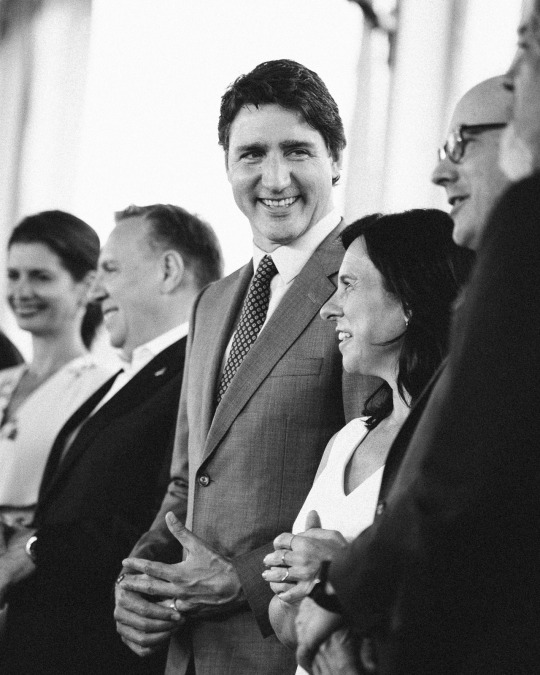

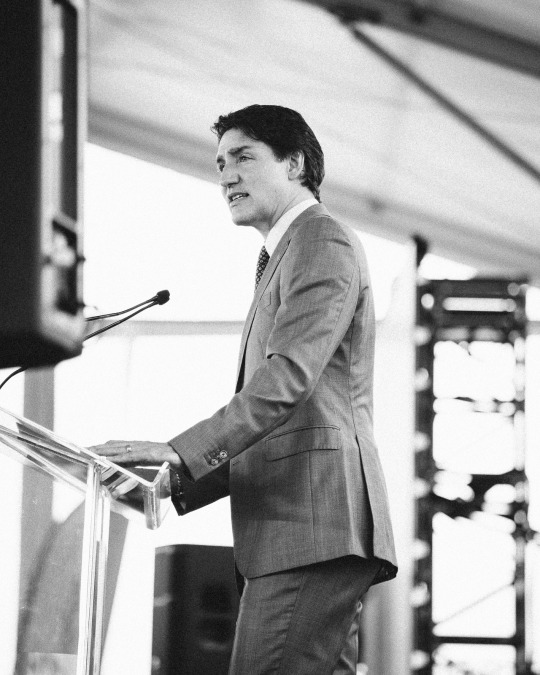


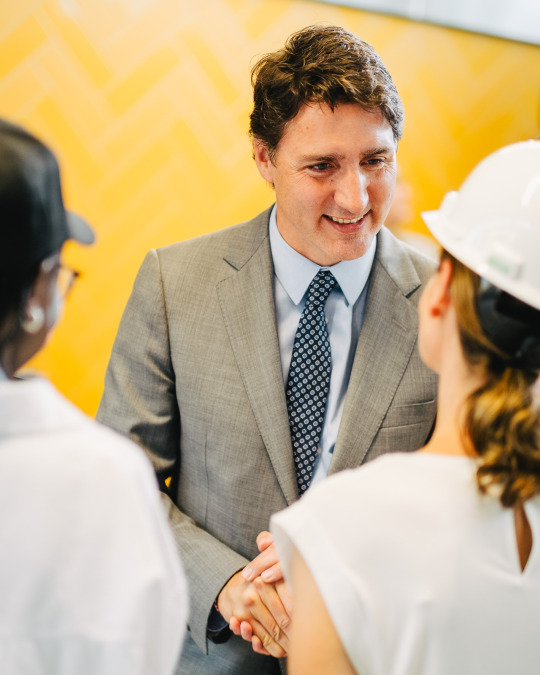

Justin Trudeau inaugurating the new REM metro system in Montreal, Canada on July 28th 2023.
#drowsteramericas#drowstercommercial#justin trudeau#canadian politics#canada#prime minister#fujifilm xt4#fujifilm
2 notes
·
View notes
Text
Le canada 🇨🇦

#canada#le canada#canada 🇨🇦#🇨🇦#justin trudeau#🤤 Justin#I like my prime ministers how I like my canadian bacon#sweet and smoky
2 notes
·
View notes
Text
apparently matthew perry once beat up justine trudeau.
1 note
·
View note
Text
The time the late ‘Friends’ star Matthew Perry beat up Canada’s prime minister
Justin Trudeau gave his public condolences on the passing of Friends star Matthew Perry and mentioned that he will never forget the schoolyard games they used to play.
Continue reading Untitled

View On WordPress
#American-Canadian actors#Canadian actors#did Matthew Perry beat up Trudeau#did Matthew Perry go to school with the prime minister?#did Matthew Perry know Justin Trudeau?#Friends star#Matthew Perry&039;s character on Friends
0 notes
Text
Biden, Trudeau vow to hold Russia accountable for war in Ukraine
New Post has been published on https://www.timesofocean.com/biden-trudeau-vow-to-hold-russia-accountable-for-war-in-ukraine/
Biden, Trudeau vow to hold Russia accountable for war in Ukraine

Washington (The Times Groupe)- US President Joe Biden and Canadian Prime Minister Justin Trudeau pledged Thursday to hold Russia accountable for its war in Ukraine, according to the White House.
The two leaders met on the margins of the 9th Summit of the Americas Thursday in Los Angeles, California, and discussed a range of topics, including regional economic cooperation, the COVID19 pandemic, migration, and food insecurity.
“The President and Prime Minister (Trudeau) underscored their commitment to continue holding Russia accountable for its brutal actions in Ukraine and reviewed their ongoing efforts to provide economic, development and humanitarian aid to the millions of Ukrainians affected by the violence, as well as to provide security assistance to the government of Ukraine,” said the White House in a statement.
During the meeting, Biden praised Canada for its “close partnership” with Washington “throughout this crisis and its leadership in enacting comprehensive sanctions and restrictions on Russia.”
“The President also stated he looks forward to seeing the Prime Minister in Madrid for the NATO Summit,” said the statement, which is scheduled to take place from June 28-30.
They also discussed the possibility of developing critical minerals in both countries, as well as how to make supply chains and economies more resilient to external shocks, including through the work of the US-Canada Supply Chain Working Group.
“As major energy producers, both Canada and the United States play key roles in supporting security and resilience of supply chains, but Leaders also emphasized a shared commitment to achieve net-zero emissions by 2050 to decrease our reliance on fossil fuels,” said the statement.
“The President thanked the Prime Minister for Canada’s support to bolster democracy in the Americas and throughout in the world, and for Canada’s support of the Americas Partnership for Economic Prosperity and the Los Angeles Declaration on Migration and Protection,” it added.
#Americas Partnership for Economic Prosperity and the Los Angeles Declaration on Migration and Protection#california news#Canadian prime minister Justin Trudeau#COVID19 Pandemic#Find the latest political news stories#Latest and breaking political news today#NATO summit#Russia Ukraine War#The Times Groupe#times of washington#Today's world news insights#Top US News Today#U.S. News & World Report#Unravel News#US Latest News Headlines#US President Joe Biden#US-Canada Supply Chain Working Group#white house#Politics
0 notes
Text

#I've no words#I'm just very very sad#Matthew Perry#Matthew Langford Perry#Justin Trudeau#Prime Minister Justin Trudeau#PM Trudeau#Oh he was such a brilliant actor and comedian#and a genuinely nice human#Favorite Canadian#Favorite Human#RIP#Canadian Twitter#Canada Chronicles
6 notes
·
View notes
Text
Montreal, Canada – Human rights advocates are accusing Canadian Prime Minister Justin Trudeau’s government of misleading the public over weapons sales to Israel, which have come under greater scrutiny amid the deadly Israeli bombardment of Gaza.
At issue is legislation that prohibits the government from exporting military equipment to foreign actors if there is a risk it can be used in human rights abuses.
But regulatory loopholes, combined with a lack of clarity over what Canada sends to Israel, have complicated efforts to end the transfers.
Dozens of Canadian civil society groups this month urged Trudeau to end arms exports to Israel, arguing they violate Canadian and international law because the weapons could be used in the Gaza Strip. [...]
But advocates say this misrepresents the total volume of Canada’s military exports to Israel, which totalled more than $15m ($21.3m Canadian) in 2022, according to the government’s own figures. [...]
Continue Reading.
Tagging: @politicsofcanada, @vague-humanoid
#cdnpoli#foreign policy#zionist occupation of Palestine#genocide#ethnic cleansing#western imperialism
7K notes
·
View notes
Text
Analysis: Is Canada Really So Immigrant-Friendly?
Trudeau’s ambitious plan to increase immigration is facing pushback from the left and right.
— By Claire Porter Robbins | Foreign Policy | August 28, 2023
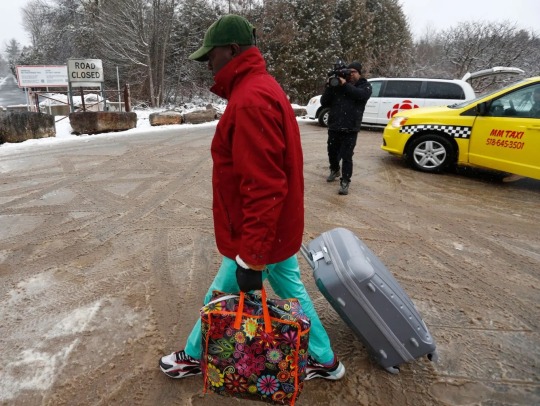
A refugee arrives at the Roxham Road border crossing at the U.S.-Canada border in Champlain, New York, on March 25, 2023. Lars Hagberg/AFP Via Getty Images
Canadians like to think of their country as a nation built on immigration. Canada, the story goes, is a bastion of multiculturalism. This narrative has been refined through smug comparison to the United States and other Western countries. At first glance, it may seem that Canada is more welcoming: While other Western nations have faced heavy criticism for their migration policies, Canada has garnered a reputation as being immigrant-friendly. Since 2019, the Canadian government has resettled more refugees than any other country, with little public backlash.
So in November, when Prime Minister Justin Trudeau announced a plan to expand immigration, it seemed like a politically savvy move. Since Trudeau took office in 2015, immigration has already increased from around 300,000 to 400,000 new residents per year. Now, Canada plans to welcome 500,000 permanent residents each year by 2025. Laid out as a way to build up the Canadian economy, which faces labor shortages and a declining birth rate, the plan prioritizes bringing in skilled immigrants. It was met with praise from major corporate advocacy groups, such as the Business Council of Canada.
Ten months later, Trudeau’s plan is facing skepticism from both sides of the political spectrum. Criticism from the far right is no surprise. But as the government has struggled to integrate and support migrants, the prospect of bringing in significantly more of them has led immigration experts and advocates to air grievances about what they see as the administration’s failings in related sectors, notably refugee resettlement and housing.
Meanwhile, public opinion on immigration has started to shift. As cost of living and housing prices stay stubbornly high, anti-immigration sentiment—long boiling—may rise to the surface.
In early 2019, controversy arose over billboards put up across the country with the slogan “Say No to Mass Immigration,” which promoted then-MP Maxime Bernier’s far-right People’s Party of Canada in the campaign for the upcoming federal election. Complaints and citizens’ petitions ultimately led the advertising company to take down the signs.
Those who complained about the billboards, including candidates from Canada’s center and left-wing parties, saw their removal as a victory for Canadian pluralism, thrown into relief by then-U.S. President Donald Trump’s xenophobic, anti-migrant policies to the south. On election day in 2019, Trudeau’s Liberal Party triumphed, while Bernier’s party received meager support.
The Liberals’ success, combined with the outcry over the far right’s weaponization of immigration, signaled to Trudeau that most Canadian voters were resolutely pro-migration. Polling seemed to back this up. The month before the election, the Environics Institute for Survey Research found that 85 percent of Canadians surveyed agreed that immigration has a positive effect on the economy, while 69 percent supported the current immigration rate.
Yet these figures obscured Canada’s long-standing challenges with diversity and inclusion. “Because Canada is pro-immigration, there’s a perception that conflates this with Canada being an open society and not being racist,” said Pallavi Banerjee, a sociologist at the University of Calgary who researches how discrimination affects young migrants’ futures.
Canada has a history of racist policies related to immigration, from the late-19th-century Chinese head tax, which forced Chinese immigrants to pay a fee when entering the country, to Quebec’s highly controversial Bill 21, a law passed in 2019 that prohibits the display of religious symbols from public servants’ attire, including crosses, turbans, kippahs, and hijabs. In one high-profile incident in 2021, Bill 21 led to the removal of a Muslim teacher from her classroom for wearing a hijab.
In a 2022 Environics survey, 46 percent of respondents agreed that “there are too many immigrants coming into this country who are not adopting Canadian values.” The term “Canadian values,” though vague, points to respondents’ desire for immigrants to assimilate. The same poll has been conducted for three decades, and while that figure has decreased from 72 percent in 1993, it still indicates that Canada has yet to fully embrace multiculturalism.
Even at current immigration levels, Banerjee said, migrants are segregated from established Canadians, limiting opportunities for them to integrate into the social fabric of their new country and thrive. According to Statistics Canada as of 2021, 41.8 percent of nonpermanent residents and 16.1 percent of immigrants who moved to Canada in the past five years lived in poverty.
The government’s failure to fully integrate newcomers has spurred skepticism of Trudeau’s new program on the left. Columnists for center and left-wing outlets have written that Canada has an “immigration elephant in the room,” referring to racism against newcomers, and that the country is “woefully unprepared for the coming immigration boom” due to funding cuts for newcomer settlement organizations, which are typically funded through a combination of federal, provincial, and private donor funds.
Advocates for refugees and other migrants are some of the loudest voices demanding reform to Canada’s immigration and settlement processes before expansion. Directors of settlement and refugee organizations, who may have otherwise endorsed Trudeau’s plans, say the system is already overloaded. Newcomers categorized as “highly skilled” have publicly complained about being stuck in a bureaucratic limbo with the immigration ministry and not receiving decisions on their residency permits for years.
Public opinion appears to have shifted as well. Even before Trudeau’s plan, anti-immigration sentiment was already worsening online due to the COVID-19 pandemic, Banerjee said, as some Canadians blamed immigrants, particularly those of Asian descent, for the spread of the disease. In July, David Coletto, CEO of Canada’s Abacus polling firm, wrote on his Substack that 61 percent of Canadians polled believe that 500,000 immigrants per year is too high, including 37 percent who feel it is “way too high.” In addition, a July Abacus survey found that four in 10 Canadians polled would vote for a politician who promised to reduce immigration levels.
Now, some Canadians are conflating a different issue with immigration: the housing crisis that Trudeau has been unable to stem in his nearly eight-year tenure. In the many think pieces about immigration, commentators have complained of already overburdened services, from health care wait times to the availability of language lessons. But the most common criticism of Trudeau’s plan to expand immigration is the lack of affordable housing.
“Canada doesn’t have a refugee problem. Canada has a housing problem,” said Francesca Allodi-Ross, who runs Romero House, a nongovernmental organization in Toronto that connects migrants with people who have spare rooms. She worries about newcomers being blamed for a housing shortage that has been a long time coming.
According to the Organization for Economic Cooperation and Development, Canada has the most expensive housing market in the G-7. Vacancy rates for rental housing are at a two-decade low, and the Royal Bank of Canada expects the country’s rental housing gap (the difference between available rental units and those seeking them) to surpass 120,000 by 2026—quadrupling today’s deficit. In early August, Stefane Marion, the chief economist of the National Bank, called on the government to revise the immigration target until housing supply could match demand, citing “record imbalance” between the two.
Meanwhile, as housing shortages threaten to affect the coming “highly skilled” migrants prioritized by Trudeau’s plan, social justice-oriented groups such as Romero House have pointed out that the government has so far neglected to provide enough housing for other newcomers who have already arrived: specifically, refugees and asylum-seekers. The government’s failure to arrange temporary housing for them was glaringly apparent over the summer, when hundreds of asylum-seekers camped outside Toronto’s emergency shelter intake center.
The way the government responds to the needs of newcomers, and especially refugees, is “very reactive—and it’s been this way for years,” Allodi-Ross said. It was only after the Toronto shelter crisis, when many media commentators questioned Trudeau’s immigration expansion program, that the municipal, provincial, and federal government committed $71.4 million to housing for refugees and asylum-seekers, and the city freed up more hotels for emergency shelter.
Directors of temporary shelters and refugee settlement programs say there is a chronic lack of state funding and support for recent arrivals. John Mtshede, the executive director of Matthew House, a shelter for asylum-seekers in Ontario’s Niagara region, said his shelter is stretched to capacity. For years, the government has repeatedly denied Matthew House’s requests for funding to develop a plot of land for additional housing. Matthew House has found its most sustainable support through private fundraising and religious groups, rather than government funding.
Like many others who work at refugee and immigration NGOs, Mtshede is frustrated with the lack of coordination between the municipal, provincial, and federal governments about who bears responsibility for housing the government’s target of a little more than 70,000 new refugees each year. “Nobody wants to take the blame for this situation,” he said.
Despite the pushback, the Liberal government appears to be doubling down and ignoring accusations that it has not funded the services required to process and settle newcomers. At a press conference in early August, a reporter asked Marc Miller, the new immigration minister, if the government would reduce the immigration targets.
“Whether we revise them upwards or not is something that I have to look at,” he said. “But certainly, I don’t think we’re in any position of wanting to lower them by any stretch of the imagination.” In the meantime, newcomers will increasingly become the fall guy for the housing crisis that has unfolded under Trudeau’s watch.
— Claire Porter Robbins is a Journalist in Calgary, Alberta, and the Founder of Btchcoin News. She has worked as an aid worker in the Middle East and in Strategic Communications for a United Nations Peacekeeping Mission.
#Canada 🇨🇦 | Economics | Migration & Immigration | North America 🇺🇸#Analysis#Immigrant-Friendly?#Prime Minister | Justin Trudeau#United States 🇺🇸#Refugees#Public Backlash#Claire Porter Robbins#Foreign Policy#Say No to Mass Immigration#MP Maxime Bernier#Far-Right | People’s Party of Canada#U.S. President Donald Trump | Xenophobic | Anti-Migrant Policies#Pallavi Banerjee | Sociologist | University of Calgary#Muslim Teacher | Hijab#Canadian Values#Multiculturalism#Racism#Newcomers#COVID-19#David Coletto | CEO#Abacus Polling Firm#Francesca Allodi-Ross#Organization For Economic Cooperation & Development#G7 | Royal Bank of Canada 🍁#Stefane Marion | Chief Economist | National Bank#Highly Skilled#Allodi-Ross#Matthew House 🏠#John Mtshede
0 notes